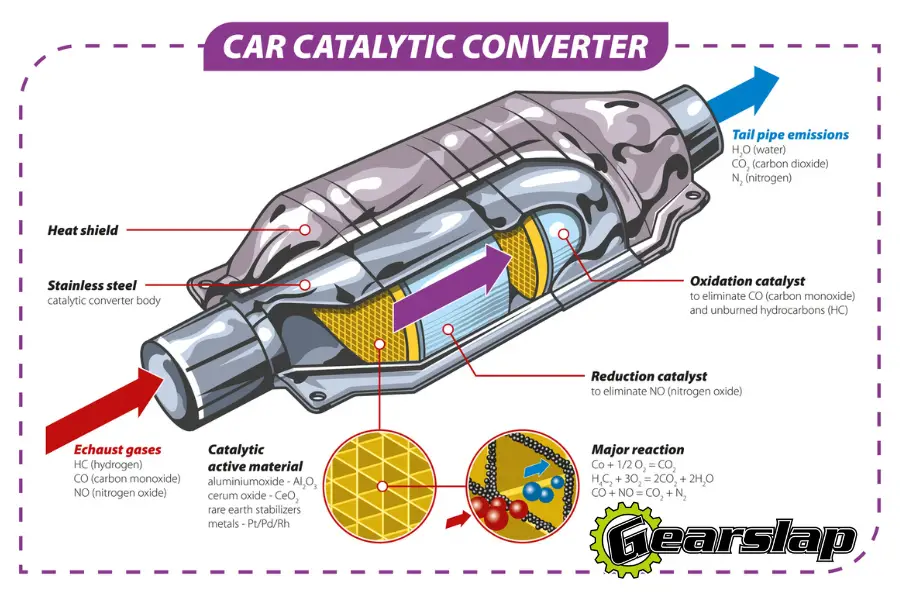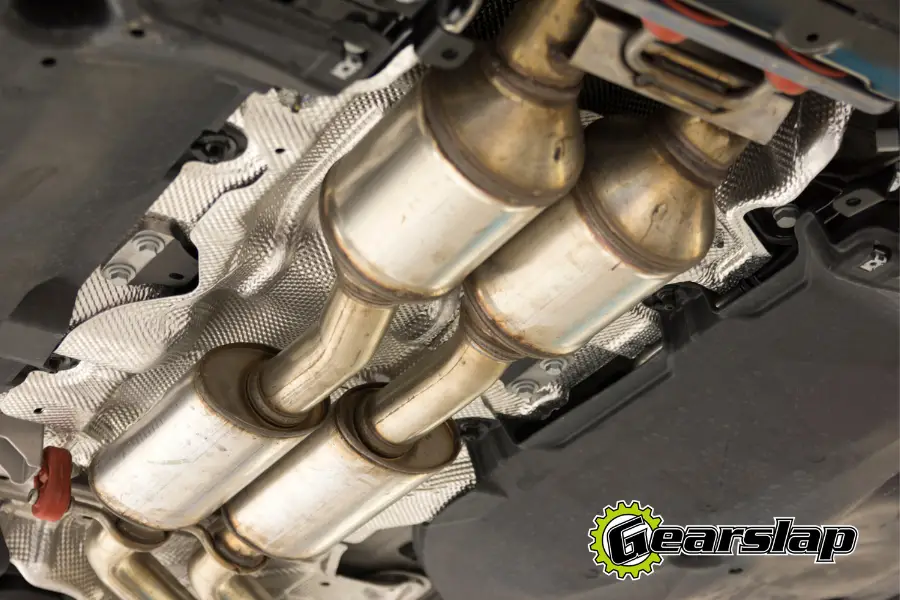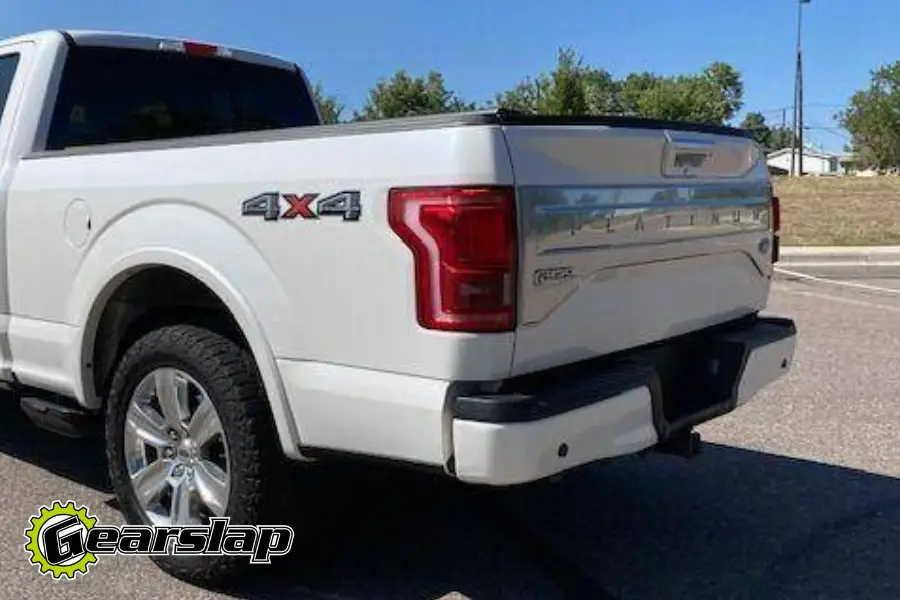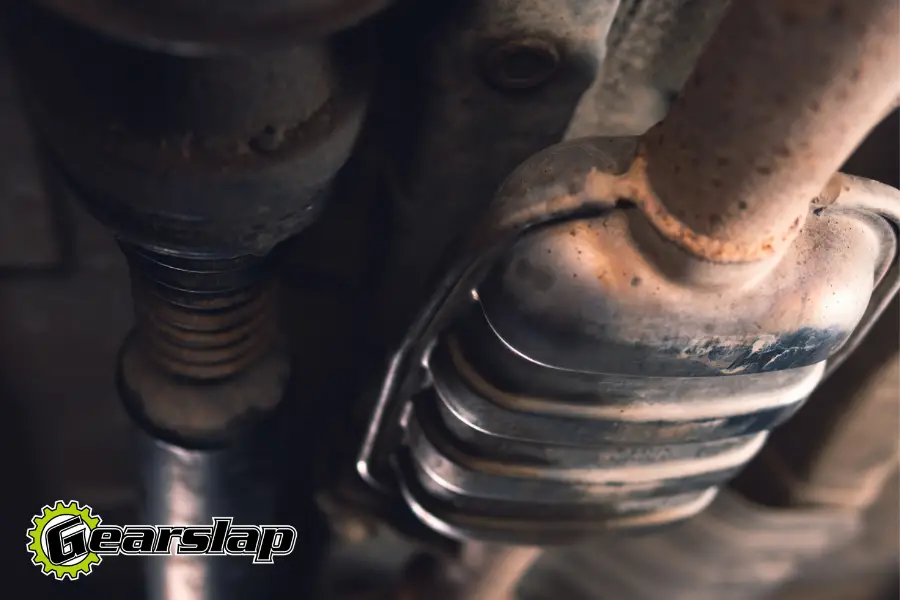Have you noticed your Ford F-150 idling strangely or possibly not starting? It might be time to check your catalytic converter. The catalytic converter is an integral part of your truck’s emissions system. If it goes bad, it can cause all sorts of problems.
If you’re having Ford F-150’s catalytic converter problems, this article will give you all the necessary information to get your truck up and running again.

What Does a Catalytic Converter Do?
A catalytic converter is a long metal device installed in many modern vehicles’ exhaust systems. Its job is to convert harmful emissions in exhaust gas into less toxic substances. Most converters contain a combination of platinum and palladium, which act as catalysts to help with the conversion process.
As a vehicle ages, the catalytic converter can become clogged with carbon and other deposits, reducing its efficiency. It can cause a loss of power and fuel economy, as well as an increase in emissions.
When my Ford F-150 hit about 125,000 miles, I started noticing some problems with my engine. I took it to the mechanic, who said the catalytic converter was the most likely culprit. The consultation and replacement cost me a pretty penny, and I always wondered if there was some way I could have diagnosed and fixed the issue myself.
You may be wondering the same thing if you’re in my shoes. Fortunately, you can learn from my mistakes.
What Are Some of the Symptoms of Catalytic Converter Failure?
Several symptoms indicate you may be dealing with Ford F-150 catalytic converter problems. These include:
- Engine running poorly or misfiring
- A decrease in fuel economy
- Check engine light is on
- The vehicle produces more exhaust gases than usual (this usually is discovered during an emissions test, and you’ll see higher hydrocarbons in the results).
- Strange noises coming from the exhaust system
If you’re experiencing any of these Ford F-150 catalytic converter problems, it’s a good idea to have your vehicle checked out by a mechanic. They can determine the situation and tell you if the catalytic converter requires replacement. You can also keep reading to find some methods for diagnosing the issue.
What Are the 3 Leading Failures of a Catalytic Converter on an F-150?
You are experiencing Ford F-150 catalytic converter problems for three main reasons.
Clogging
Over time, carbon deposits and other materials can clog the honeycomb structure of the converter. This reduces the converter’s efficiency and can cause exhaust problems.
If you smell a rotten egg smell coming from the exhaust or start seeing a lot of smoke, chances are your catalytic converter has clogged.
Catalytic converters manage the engine’s gasses. They work as a filter, and as the truck ages, the buildup of harmful emissions that get through the converter blocks the exhaust pipe.
Damage from Fuel Additives
Some fuel additives can damage the platinum and palladium in the catalytic converter, causing it to fail. Fuel additives improve the quality of gasoline and prevent corrosion. However, some of them can be harmful to your catalytic converter.
If you use an additive that contains methylcyclopentadienyl manganese tricarbonyl (MMT), it can damage the platinum and palladium in your converter. Some octane boosters and fuel stabilizers contain MMT.
Heat Damage
Excessive heat exposure, such as from a vehicle fire, can also cause Ford F-150 catalytic converter problems. Other examples of extreme heat exposure include towing a trailer that’s too heavy or driving in stop-and-go traffic. If the converter overheats, it can melt the platinum and palladium, causing it to fail.
If your catalytic converter fails due to heat or fuel type damage, avoid doing these things in the future after your catalytic converter replacement.

How Many Catalytic Converters Are on a Ford F-150 (Most Years)
There are usually two catalytic converters on a Ford F-150. One sits near the engine, and the other is towards the back of the vehicle.
Can I Unclog the Catalytic Converter on My Ford F-150 Truck?
If you’re experiencing Ford F-150 catalytic converter problems due to clogging, there are a few things you can do to try and clean it.
Use a Catalytic Converter Cleaner
Catalytic converter cleaners are designed to enhance the function inside of the converter without damaging it. You can discover these cleaners at most auto parts stores.
Clean the Engine
If the engine is dirty, it can cause the converter to clog. Cleaning the engine can help reduce the amount of carbon buildup in the converter.
Replace the Spark Plugs
If the spark plugs are dirty or worn out, they can cause the engine to run poorly. This can lead to excessive carbon buildup in the converter. Replacing the spark plugs can help prevent this problem.
Run Richer Fuel Mixtures
If your fuel mixture is too lean and airy, it can clog the catalytic converter. Running a richer fuel mixture can help prevent this problem. Consult an auto expert to determine the fuel mix best for your Ford F-150.
Replace the Oxygen Sensor
If the oxygen sensor is faulty, it can cause your engine to run lean. This can lead to carbon buildup in the converter. Replacing the oxygen sensor can help prevent this problem and keep your catalytic converter running well.
Use a Higher Octane Fuel
If the fuel you’re using isn’t high enough in octane, your engine can also fill with air. This can lead to carbon buildup in the converter. Using a higher octane fuel can help prevent this problem.
If you’ve done everything listed above and you’re still dealing with Ford F-150 catalytic converter problems, it may be time for a full replacement.
Can I Replace the Catalytic Converter on My F-150 Myself?
Fords are built tough, but that doesn’t mean they’re indestructible. Over time, parts will start to wear out and break. When this happens, you’ll need to decide whether you want to replace the part yourself or take it to a mechanic.
Replacing a catalytic converter is a pretty big job. While this article will give you directions, it doesn’t suffice as experience or full instruction for the intensity of the job.
Your bolts may get stuck due to rust, and you’ll likely work in a tight space. It may be helpful to lubricate the bolts to give them time to loosen. You should also have a friend help you, as they can hand you tools and parts as you need them.
Replacing such a vital part yourself is typically not something I would recommend doing if you’re not comfortable working on cars. If you decide to do it yourself, it’s best if you’re handy with tools and have some mechanical experience. With the correct information, you might be able to replace the catalytic converter on your F-150. However, it’s not a simple job.
You’ll need to lift the truck so you can access the converter. Then, you’ll need to disconnect the exhaust system and remove the old converter. Once the old converter is out, you’ll need to install the new one and reconnect the exhaust system. If you don’t feel completely confident in your job, it’s best to leave it to a professional.
Let’s look at some minor details to make the process easier.
- Park the car safely on a level surface. You will be working underneath the vehicle, so it must be stable. If you have a jack and jack stands, you can use them to lift the car. If not, take it to a professional to lift it. Use wood to block the tires to prevent the truck from rolling while in the air.
- Locate the catalytic converter. It typically sits located near the middle or back of the vehicle.
- Disconnect the exhaust system. There are usually bolts or clamps holding the pieces of the exhaust together. You’ll need to remove these so you can access the converter.
- Remove the old converter. Use a socket wrench to remove the bolts holding it in place. Once it loosens, you can pull it out. There are usually bolts holding the converter in place. Once you remove these, you can take the converter out.
- Install the new converter. Put the new converter in place and bolt it down.
- Reconnect the exhaust system. Put the exhaust system back together and tighten the bolts or clamps.
- Lower the car. If you’re using a jack and jack stands, lower the vehicle carefully until it’s resting on the ground.
- Test drive your F-150 to make sure the new converter is working properly.
If you have any questions about replacing the catalytic converter on your F-150, ask a mechanic. They can help you with the process and ensure the job gets done correctly.

How Much Does It Cost to Replace a Catalytic Converter on an F-150?
The cost of a catalytic converter replacement on an F-150 can vary depending on a few factors. The most important consideration is the type of converter you need. There are two types of converters: standard and universal.
Standard converters are specifically for your Ford F-150. They’re a perfect fit and will work with your exhaust system. Universal converters, on the other hand, fit a variety of vehicles. They might not be an exact fit for your car, but they’ll still get the job done and save you money in the process.
Universal converters are usually less expensive than standard converters. However, they might not last as long as a standard converter. If you’re looking for a converter that will last, it’s best to get a standard converter that fits your vehicle perfectly.
Another crucial factor that can affect the cost is the labor involved in replacing the converter. If you’re doing it yourself, it will probably cost less than if you’re taking it to a mechanic.
Finally, the price of the converter itself can vary depending on the brand and where you buy it. It’s vital to compare prices before you make a purchase.
In general, you can expect to pay between $150 and $2500 for a new catalytic converter.
DIY Price & Considerations
If you’re considering replacing the catalytic converter on your F-150 yourself, you should know a few things. First, it’s not a simple job. As mentioned before, you’ll need to lift and secure the truck so you can access the converter. Then, you’ll need to disconnect the exhaust system and remove the old converter.
Once the old converter is out, you’ll need to install the new one and reconnect the exhaust system. Though it’s only a few steps, the job is intensive, especially for one without experience working on cars.
You will save on labor by doing it yourself, but you must factor in the cost of lifting the vehicle and buying the new converter. You can expect to spend between $100 and $200 on labor with a DIY, which seems like a small amount compared to the price of the converter. Therefore, you’re only saving about 10 percent on the total cost by doing it yourself.
Fault Codes
Another important aspect to consider is the fault codes of your vehicle. If your catalytic converter is beginning to go bad, you will likely get a check engine light. Before replacing the converter, try resetting the code to see if it returns. If the code doesn’t come back, you might not need to replace the converter.
If you don’t install the converter correctly, you will get a fault code and will have to take it back to the mechanic to fix it. An improperly installed catalytic converter will create more harmful emissions and likely won’t pass inspection. It will also cause the vehicle to burn more fuel. This is why if you’re inexperienced, it might be best to leave the job to the professionals.
If you choose to tackle the job, be sure to follow all the instructions carefully. If you’re not comfortable with lifting the vehicle or working on the exhaust system on your own, the money you save doing it yourself might later have to be spent on a repair job with a much higher price tag.
Mechanic Price & Considerations
If you resolve to take your F-150 to a mechanic to replace the catalytic converter, you can look to pay between $900 and $2500. The price will depend on the type of converter you need and the labor involved in the repairs.
You might be able to save on the cost of the converter by buying it yourself and taking it to the mechanic. However, you’ll still need to pay for the labor. It’s probably best to let the mechanic handle the entire job so you can be sure your truck will run perfectly again.
When choosing a mechanic, pick one qualified to work on your vehicle. You can consult friends or family for recommendations or look for a mechanic specializing in Ford vehicles. Most mechanics offer a warranty on services completed. If something were to go wrong, you could simply take the truck back to have it fixed at no extra cost.
Using a mechanic saves you the time and effort of replacing the converter yourself. However, it is more expensive. If you’re adhering to a budget, it might be worth considering doing it yourself, but only if you have the knowledge and experience to do the job correctly.

